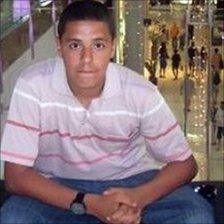Gang murdered boy during rush hour at Victoria station
- Published
CCTV footage shows the gang of youths pursuing Sofyen Belamouadden
Eight young people have been convicted of killing 15-year-old Sofyen Belamouadden in front of horrified commuters at one of the UK's busiest stations.
The series of linked trials involving 20 defendants has been the biggest-ever joint prosecution of a gang over a killing.
The Appeal Court's decision that Junior Bayode, who was found guilty of manslaughter, will not face a retrial for murder marks the end of a prosecution that revealed how tensions between youths could spiral out of control in the heart of the capital.
As commuters headed towards Victoria Station during the evening rush hour of 25 March 2010, they were confronted with a horrifying scene.
A teenager stood in the middle of the road, wielding a samurai sword, and then led an armed gang in a charge towards their rivals.
In the melee that followed, Sofyen was chased into the London Underground station by as many as 15 of the youths who stabbed, kicked and punched him to death.
Joint enterprise
The teenagers were originally charged with murder under joint enterprise, a legal principle which allows people to be prosecuted for being party to an offence that they could have foreseen because of their common criminal intentions.
Under the principle, prosecutors need not prove who inflicted the fatal wound - only who played a part in the incident.

Sofyen Belamouadden was stabbed nine times in a 12-second attack
But it has taken two years for all of the group to face a jury, with the final defendant, Junior Bayode, appearing in a fourth trial as he was too ill to appear earlier.
The death was a result of petty feuding and increasing tensions between youths from different schools in west London.
The gang that killed Sofyen was based around St Charles College in Ladbroke Grove. The victim, who was not a member of a gang, was from a Fulham school.
Both groups travelled through Victoria Station daily and the St Charles pupils had come to regard it as part of their "home territory".
The night before the killing, there had been a small fight between the youths at Victoria Station, leaving one of the St Charles students with a bloodied nose. Police, who had increased patrols due to the tensions, split them up.
Detectives said social media was partly to blame for what followed.
Det Ch Insp John Macfarlane said: "In years gone by there was time for the situation to calm down and tempers to calm. After the boy got a bloody nose there was instant Blackberry Messenger and Facebook usage across London... Huge numbers knew about it."
The St Charles pupils were angry and prepared for a confrontation or "madness", recruiting "troops and weapons" with talk of people getting "slumped" - killed.
Victoria Osoteku, convicted of manslaughter, bought kitchen knives from Argos as at 18, she could pay for the age-restricted items.
The attack
The next day the youths assembled outside Victoria Station with weapons including a Samurai sword, flick knives and machetes.
CCTV shows shocked bystanders leaping out of the way as they charge across Terminus Place - where buses arrive and depart - towards the other gang, openly brandishing knives.
The St Charles gang split up, with one group following Samsom Odegbune, 18, who wielded the samurai sword and was convicted of murder.
The other group chased Sofyen, who was unarmed and had become separated from his friends, into the District and Circle Line ticket hall where he was surrounded. In an attack which lasted 12 seconds, he was stabbed nine times.
His father, Abdeslan, known as Abdullah, fled the court in tears when CCTV was shown during the first trial.
One witness said the level of aggression was indescribable: "The group who were pursuing him had a pack mentality, no-one was acting objectively."
Another said they arrived in a group and left as a group, like a flock of starlings moving together.
Police say only one of the defendants had a previous conviction, with many expecting to go to university.
Prosecutor Mark Heywood QC said it was purely because they were in such numbers that they acted in that manner.
"It perhaps begins to explain why and how it came to be people such as they, youthful and still learning formally in schools and colleges and learning from life, behaved in such a brutal and merciless fashion such as none of them had ever done before," he told the Old Bailey.
"It's begins to explain why they did together what in all probability they could not ever have done alone."
Samuel Roberts, convicted of manslaughter, offered some explanation during his defence: "I honestly don't know why I kicked him in the head. I don't know what I was thinking. Everyone else was doing it. It was stupid, I don't know what to say."
Sofyen's father said his death had devastated his family.
"I often think of the suffering he must have gone through, that he was set upon with such savagery and why I was not there to protect him," he said.
- Published24 April 2013
- Published24 April 2013
- Published24 April 2013
- Published18 January 2012